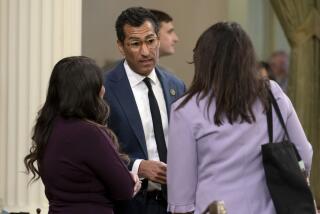What D.C. voters deserve
- Share via
THURSDAY WAS TO have been the day the House of Representatives supported representation in that body for 600,000 long-suffering residents of the District of Columbia, whose license plates bear the bitter slogan “Taxation Without Representation.” But Democrats postponed a vote on the bill after Republicans tried to load it down with a provision weakening gun control in the district.
Democrats promise to return to the legislation, which would give D.C. residents a seat in the House and award another seat to Utah, increasing the size of the body to 437 members. The bill is opposed by President Bush on constitutional grounds.
The constitutional issue is a difficult one. Opponents of the legislation point to language in Article I of the Constitution saying that “the House of Representatives shall be composed of members chosen every second year by the people of the several states.” Obviously, the District of Columbia is not a state. The legislation’s defenders counter by citing the same article’s grant to Congress of the right to legislate “in all cases whatsoever” involving the district.
This war of constitutional citations -- which the courts would have to resolve, in any case -- is less important than the fact that D.C. residents, who have been able to vote for president since 1961, have no effective voice in the “people’s house” of Congress. The legislation would give them that voice, though it would have no effect on the Senate.
This is an exceedingly modest proposal, both legally and politically. It doesn’t purport to turn D.C. into a state, which clearly would require a constitutional amendment. Politically, its enactment would be a wash. Democratic-leaning D.C. would get a seat in the House, but so would Utah, a red state that came closest to earning additional representation in the last census. The supposed justification for adding two seats is that a 436-member House could deadlock. The real reason is to win Republican support.
It’s a price advocates of representation for D.C. are willing to pay. But what about the rest of us? It depends on how important we view congressional representation for D.C. residents. Ideally, most of the district, except for the so-called Federal Triangle, would be turned over to Virginia or Maryland, and those residents would become Virginia or Maryland voters. But that option is about as likely as D.C. being granted a vote on its own.
So D.C. voters (and those who support them) are left with an absurd compromise that reaches all the way to Utah to get them a seat in Congress. If Congress approves the legislation, Bush should reconsider his veto threat. Government officials and lobbyists shouldn’t be the only denizens of the district to have a say in the nation’s laws.
More to Read
Get the L.A. Times Politics newsletter
Deeply reported insights into legislation, politics and policy from Sacramento, Washington and beyond. In your inbox twice per week.
You may occasionally receive promotional content from the Los Angeles Times.










